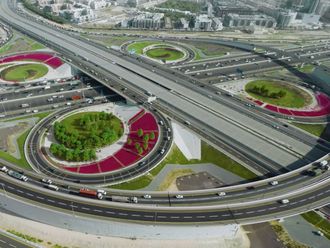
Abu Dhabi: The Environment Agency - Abu Dhabi (EAD) has issued a new resolution concerning administrative penalties and fines for violators of environmental regulations in Abu Dhabi, with the value of the fines ranging from Dh1,000 to Dh1 million.
The resolution, issued by Sheikh Hamdan bin Zayed Al Nahyan, the Ruler’s Representative in Al Dhafra Region and Chairman of the Board of Directors of EAD, has been developed with the purpose of strengthening EAD’s regulatory and supervisory role and supporting mechanisms to prevent actions and activities that negatively impact the environment. It also covers all practices that harm the environment which are not included in the currently applicable regulations, thereby enhancing compliance to environmental regulations in the Emirate.
According to the resolution, violations were classified into three categories: namely development and industrial violations, hunting, biodiversity and reserves’ related violations, and fishing and discharge in marine environment violations. The value of each fine was determined in accordance with the recurrence of the violation, gradually increasing upon the second and next violations. The value of depends on the violation and the extent of damage caused to the environment and recurrence rate.
The resolution effectively enforces the set of administrative penalties and fines stipulated by Law no. (10) of 2020, for the amendment of some articles of Law no. (16) of 2005 concerning the restructuring of the Environment Agency – Abu Dhabi. Under the law, EAD was granted the authority to impose an administrative fine on actions violating this Law and its executive and regulatory bylaws. This is in addition to re-enforcing its implementation rules, policies, resolutions, and circulars. This should support EAD’s supervisory role and enable the Agency to undertake its role more effectively in preserving the environment and biodiversity in Abu Dhabi.
This resolution provides EAD with a legal tool that empowers inspectors to implement the list of administrative violations and fines to facilities, projects and individuals directly, which will reduce the number of judicial referrals for environmental violations.
Reconciliation of violations
The decision also includes the possibility of reconciliation for violations that may be reconciled according to specific criteria with EAD. These include the nature of the violation and its environmental impact or damage in return for reducing the value of the prescribed violation by 25 per cent. This is expected to motivate establishments and projects to reconcile with the Agency to reduce the value of violations provided that the causes of the violation are removed first, upon request.
An administrative mechanism to impose fines will be utilised, including several procedural guarantees, such as a grievance system and reconciliation against reduction of the imposed fine amount. This would encourage facilities and projects to reconcile with the agency to reduce the value of fines – provided the environmental impacts of the violation have been removed before.
The agency utilises smart electronic tools and systems that enable it to conduct environmental inspections and ensure the commitment and compliance of licensed projects and facilities with the environmental requirements. Similarly, EAD is tasked to evaluating risks and enhancing the implementation of the integrated environmental commitment system. Such tools assist EAD in preparing evaluation reports of industrial sectors to provide a clear overview of the environmental situation in the Emirate – supporting effective decision-making for the benefit of the environment and the society.











